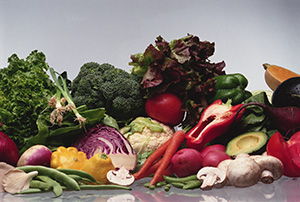
The food industry adds chemicals as they flake, texturize, pasteurize, homogenize, freeze, can, condense, spin and juice their products. To add insult to injury, they are now genetically engineering our food supply.
by Stan Kalson —
When choosing foods for your family, whole foods are your best value. A carrot grown with chemical fertilizers and sprayed with pesticides is just not the same as a short, fat, ugly-looking, pesticide-free carrot grown with natural compost. Scientific research has proven that pesticides and other petroleum-based chemicals may be dangerous to your health; they have been linked to the cause of many cancers, high blood pressure, birth defects and genetic mutations.
True, the long-term dangers in many additives used to process foods have not all been scientifically proven. However, as long as we eat food containing additives, we are all involved in a large, long-term experiment, of which we will probably never know the full outcome in our lifetimes. These chemicals work slowly, and the long-term poisoning of our bodies may affect future generations.
The food industry adds chemicals as they flake, texturize, pasteurize, homogenize, freeze, can, condense, spin and juice their products. To add insult to injury, they are now genetically engineering our food supply. While the effects are only speculative at this point, we know these processes alter and destroy many foods’ molecular structure.
Consumers’ only defense is to eat food grown the old-fashioned way — using natural methods — and eat them fresh.
If we examine the human body as part of the whole ecosystem, it makes sense that we have evolved to digest foods as they grow in nature. Natural foods have sustained us for thousands of years. It has only been in the last 100 years that so-called advanced societies have managed to alter food’s natural condition, simultaneously increasing our incidences of cancer and heart disease.
Scientists claim that man’s life span has increased and they attribute this to modern medicine and improved sanitation. But it’s doubtful whether tampering with our food supply has helped people live a healthier, longer life. Living to 90 years in a nursing home, hooked to tubes and kept alive artificially, is not quality living. However, many seniors living on healthy whole foods, who have a positive mental attitude and get regular mild exercise, are self-sufficient and in relatively good health.
Here are some whole food recipes to enjoy.
Broccoli with Sesame
Ingredients:
- 1 bunch broccoli
- 1 tablespoon cold-pressed vegetable oil
- 1/2 cup water
- 2 tablespoons roasted sesame seeds
Instructions:
Slice 1/2 inch from the bottom of the broccoli stalks; peel off the tough skin. Cut the broccoli florets from the stems and chop the stems into fine pieces. Heat the oil in a 1-1/2 quart saucepan and sauté stems for two minutes; add the water, reduce heat to minimum, cover and cook for three minutes. Arrange the florets on top of the stems; cover and steam for five minutes more or until broccoli is bright green. Lightly grind the sesame seeds in a mortar. Transfer the broccoli to a serving platter and toss with seeds. Serve immediately.
Millet Casserole
Ingredients:
- 3 cups millet
- 1 medium onion, chopped
- 1 teaspoon cold-pressed vegetable oil
- 1/2 red bell pepper, chopped
- 3 celery stalks, chopped
- 3 cups water
- 1 teaspoon sea salt
Instructions:
Wash and drain the millet and chop the onion. Place the millet in a heavy skillet and dry roast, stirring constantly until the millet becomes fragrant; remove from heat. Heat the oil in a 3-quart saucepan over medium heat. Add the onion and sauté for two to three minutes; add the red pepper and celery to the onion, stirring well before each addition. Add the millet, water and salt, and bring to a boil. Reduce heat, cover and simmer for 40 minutes or until the millet is cooked.
Field Greens, Watercress and Kale Salad
Ingredients:
- 1/2 pound field greens
- small bunch watercress
- 1 small bunch tender kale
- 2 stalks celery, sliced
- 1 small tomato, sliced
- 1 ripe medium avocado, sliced
Instructions:
Wash greens thoroughly. Tear the greens into small pieces. Strip the tender young kale greens from the stalk. Save the stalks to use in your soups; add celery; toss and place sliced avocado and tomatoes on top. Serve with your favorite dressing.
Stan Kalson, founder and director of the International Holistic Center, Inc., has been active in the Greater Phoenix holistic community for 28 years. www.holisticresources.org.
Reprinted from AzNetNews, Volume 24, Number 5, October/November 2005.





July 23, 2013
Blood pressure, Cancer, Farmers' markets, Food, Nutrition and Diet, Fruits and Vegetables, Genetically modified, Organic, Recipes